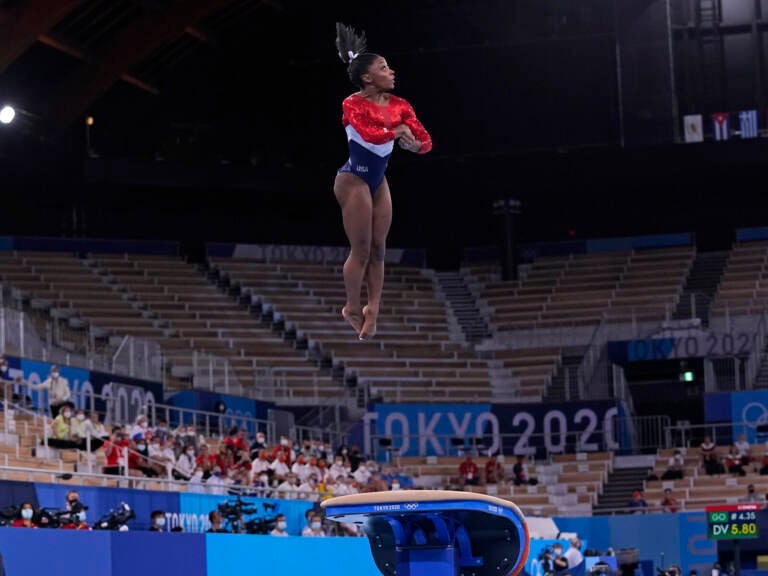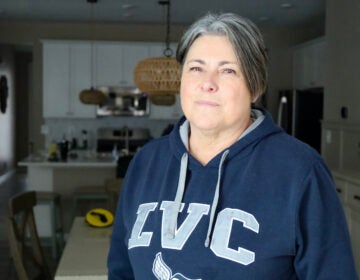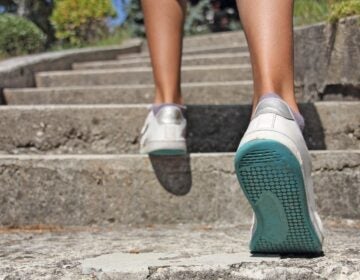Simone Biles’ decision to prioritize her mental health a sign of American culture shift
WHYY host Cherri Gregg speaks with Zakia Williams, co-founder of Black Men Heal, about Simone Biles’ mental health decision.
Listen 5:54
Simone Biles from the U.S. performs on the vault during the gymnastics women's team final at the Summer Olympics on Tuesday in Tokyo. (Gregory Bull/AP)
The decision by Simone Biles — the greatest gymnast of all time — to withdraw from the U.S. Olympic team competition to prioritize her mental health drew criticism, but also massive praise. Her decision is not the first of it’s kind: Weeks ago, tennis superstar Naomi Osaka withdrew from the Australian Open, in part to avoid the social anxiety she experiences when forced to speak with reporters.
Many say the decisions of these elite athletes signal something deeper. WHYY radio host Cherri Gregg spoke with a mental health professional about what this culture shift could mean for young athletes, parents, and beyond.
Zakia Williams is co-founder and chief operating officer for Black Men Heal. Welcome.
Thank you. Thank you so much for having me, Cherri.
So everybody has been talking about Simone Biles and her decision not to compete and the U.S. Olympics team sport. Your reaction as a mental health professional?
My first reaction was number one, I applaud her. Simone Biles and Naomi Osaka, I applaud them for prioritizing their mental health. To me, it was like a step in humanizing them. They have personal lives. They have emotions. They have feelings and anxieties, just like the rest of us. So by them taking that stance, it forced people to separate what they do from who they are.
This decision that Simone Biles made, it has a ripple effect. And do you think it’s a signal? And Naomi Osaka, you mentioned her. There were a lot of people raised to never quit. You never backed down. You sacrifice your physical body. You sacrifice everything for the team, for the institution, for the love of the country. But it seems like that is no longer the case. Does this signal a shift in culture?
It does signal a shift in culture. Like I’m 45, and I know that I was taught to work hard, get a job, work hard, go to college, do your 30 years, you know? And my mom even told me personally, “sometimes you have to work twice as hard to be as successful,” that type of thing. So I was raised in that mindset. … I have a 21-year-old. What I’m realizing about this generation is they want to work smarter, not harder. The pandemic has shown that you can get work done. You don’t have to be at this building from 9-to-5. A lot of the companies were saying that their stay-at-home workers were more productive at home. So I think it’s a shift in the culture. And this COVID just pushed it. Eventually, whatever you’re dealing with internally is going to affect you externally. We charge everything else. We charge our phones, we charge our cars, our electronics. But no one wants to apply that same logic to our brains. And I think it’s past time that we should.
At the same time, a lot of parents have 12-year-olds, 10-year-olds, and they’re playing sports and they’re telling, “I get tired. I don’t want to do it.” Where’s the line? Because the last thing we want is kids that are going to give up because something is tough. Where is the line between toughing it out in a good way and forcing somebody to tough something out that causes trauma? Where’s that line?
But it’s a difference between pushing yourself when you’re trying to achieve a reasonable goal at your healthiest self versus an unrealistic goal where you’re not at your healthiest point. And when I say healthy … we should be encompassing our mental health as well as physical health. I think that is a very important conversation that parents should have with their children about why they want to stop. It’s something different than, “I don’t want to go to practice today because I want to hang out with my friends” or “I want to veg in front of the TV and watch my favorite show.” But you have to… I think it’s important to have those conversations as to why these kids don’t want to go further. So we need to start having those conversations with our children. What don’t you like about soccer? What don’t you like about baseball? And maybe getting to having a conversation with the coaches, just changing the whole dynamic of how it looks.
Yeah. And I have to say, I mean, people understand Simone Biles. I mean, you’re not in a mental space. You can literally break your neck, you can break your back, you could come down one false move and you could kill yourself or get killed. So people understood that. But the fear, I think, with some parents is, “oh, my goodness, this is going to mean… what does this mean for pushing your kids?”
Right.
And you don’t want to push them in a bad way. So this represents, in your mind, a culture shift, a change. We should be having those conversations. I think it’s going to be a ripple effect.
What made the culture shift? What made the culture shift was pop culture, to be honest, in my opinion. You know, we had rappers come out, we had entertainers, we had actors come out and they vocalize what they were going through with their mental health. And also with this generation, social media, … they share what they’re going through. They’ll say, “Oh, I’m depressed.” It’s almost like a pop culture phenomenon that indirectly changed, or it’s removing, the stigma behind mental health.
Ten years ago, if somebody else had said this, do you think the reaction would have been this positive?
No, no, I do not. It’s the culture shift, it’s these millennials, it’s this Gen Z generation. They are unapologetically saying, “No, I need this for myself.” And to be honest, I think we need to take a cue from them.
I wish I had known when I was a young woman at 20, I could have said no. And where do you see this culture shift going?
So many other athletes, gold medal winner athletes, have been saying, “I wish that I could have said that.” A lot of us can see ourselves in her. I think it’s going to be a good thing. And I’m looking forward to people prioritizing their mental health. It’s very, very important.

Get daily updates from WHYY News!
WHYY is your source for fact-based, in-depth journalism and information. As a nonprofit organization, we rely on financial support from readers like you. Please give today.







